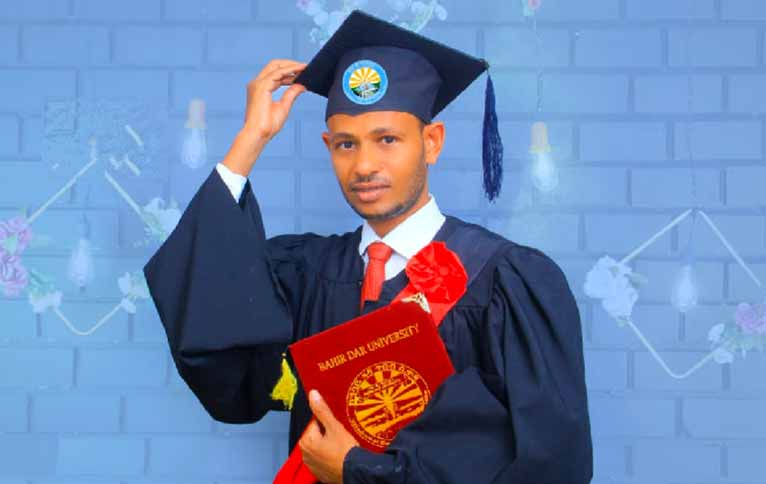When the African Development Bank launched a project to enhance institutional and human capacity in Sudan’s education sector, Ahmed Mutiagin was a student with ambitions of getting into academia.
That goal has been realised; Mutiagin, 38, is now a proud holder of a PhD in Education, Leadership and Policy from the Bahir Dar University in Ethiopia, and is teaching at Sudan’s Sennar University in the Faculty of Education. He is also the Vice Dean for student affairs there.
“My life has improved since my graduation through writing research papers and developing the education system,” he says. “I have benefited from my PhD a lot. It has opened up many opportunities for me, and I am now writing books.”
Under an African Development Bank programme called Capacity Building for Improved Quality of Education System and Skills Development, Mutiagin had his doctorate financed by a Bank grant.
Launched in 2015, it has enabled eight young Sudanese, including Mutiagin, to obtain PhDs. Twenty-one other students have graduated with master’s degrees and have gone on to pursue careers in education. More than 80 others are pursuing a blended master’s degree in education planning.
Haliema Ahmed, 28, got her MA in educational and planning management from the same university as Mutiagin and says that although she completed the course successfully, she, along with other female students, encountered housing difficulties.
The project sought, among other things, to upgrade the capacity of lecturers, teachers and their trainers. It also aims to modernise the training of technical teachers and increase access to technical vocational and education training for young Sudanese who may have limited opportunities for university education.
 Like Mutiagin, Ahmed Mansour Mohammad Gasmelseed pursued a PhD in Education Leadership and Policy and is currently working as an assistant professor in the education faculty at the University of Gezira. “I have got a lot of benefits from my study [programme],” says the 42-year-old. “We are the first batch in the country holding a degree in this field of study, and we came back very excited [and ready] to teach others.”
Like Mutiagin, Ahmed Mansour Mohammad Gasmelseed pursued a PhD in Education Leadership and Policy and is currently working as an assistant professor in the education faculty at the University of Gezira. “I have got a lot of benefits from my study [programme],” says the 42-year-old. “We are the first batch in the country holding a degree in this field of study, and we came back very excited [and ready] to teach others.”
The Bank has invested $21 million in the project, which is being implemented in partnership with Sudan’s Federal Ministry of General Education. The beneficiaries come from various parts of Sudan.
A mid-term review by the Bank shows that the project funded in-service training for over 5,000 teachers, with another 300 government officials being trained in short courses related to education planning and management. Over seven technical vocational and education training institutions have been constructed and handed over to the government. Of these, four are girls’ schools. But rising costs, as well as the Covid-19 pandemic, have posed some implementation challenges.
“Investing in skills development, especially among the youth, is an effective strategy in tackling Sudan’s escalating fragility,” says Hendrina Doroba, the Bank’s Manager for Education and Skills Development.
Technical education and training have benefited greatly, and there are “massive opportunities” for employment for those who graduate, says Hassan Suleiman, Sudan’s director of technical vocational and education training.
Female students have also taken an interest in technical vocational and education training. Omdurman Vocational School Girls, for example, boasts 400 female students. Wahiba Hussein A. Alraheim, the school director, says the students receive practical training in various disciplines, ranging from commercial (accounting, costing and insurance) to industrial (electrical installation, technical drawing and workshops).
Wahiba says some of the main challenges facing vocational and education training at vocational colleges are enhancing the curriculum and training teachers — a view echoed by director Suleiman. “Well-equipped workshops and intensive training for teachers are highly recommended to attract more students,” he says.
Renovating and expanding institutions and increasing ICT literacy are key to sustaining technical training, according to the Bank’s mid-term review. These elements are also essential for setting up the National Centre for In-service Teacher Training in Sudan.
For Kosti Technical School Boys in White Nile, renovation financed by the Bank means it will expand its admission to include women, especially those keen on acquiring farming skills. “The school [now] has the capacity to accept girls in some disciplines such as agriculture,” says manager Alkhir Yousif.
